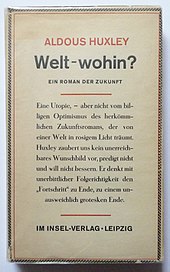Brave New World
![]()
The title of this article is ambiguous. For other meanings, see Brave New World (disambiguation).
![]()
Brave New World is a redirect to this article. For the album by the band Iron Maiden, see Brave New World (album).
Brave New World is a dystopian novel by Aldous Huxley, published in 1932, which describes a society in the future, in the year 2540 AD, in which "community, identity, stability" seem to be guaranteed.
By means of physical manipulation of embryos and fetuses and the subsequent mental indoctrination of infants, people are molded according to the particular social castes to which they are supposed to belong, ranging from alpha-plus (for leadership positions) to epsilon-minus (for the simplest jobs).
Common to all castes is the conditioning to permanent gratification through consumption, sex and the drug soma, which deprives the members of this society of the need for critical thinking and questioning of their world order. The government of that world is formed by controllers, alpha-plus-men, who are worshipped like idols by the population.
The work is one of the most influential novels of the 20th century. It inspired writers of all generations to create their own visions of the future. In 1998, the Modern Library, a major English-language institution for literature and the arts, ranked it 5th among the 100 best English-language novels of the 20th century. Brave New World also appeared in similar lists by the BBC and the Observer.
Furthermore, Brave New World is required reading in some German states in the subject of English for the Abitur. Alongside George Orwell's 1984, the novel is considered a prime example of a totalitarian state in literature.

World - where to? German first edition, Insel 1932
Title
The title refers to a dialogue in the 8th chapter of the novel, quoting from Shakespeare's drama The Tempest (Act 5, verses 181-183): "O, wonder! How many goodly creatures are there here! How beauteous mankind is! O brave new world, that has such people in't!" (Engl. "O, wonder! How many goodly creatures are there here! How beautiful mankind is! O brave new world that bears such citizens!" (Schlegel-Tieck translation)).
Motto
The book begins with a French quote from Nikolai Alexandrovich Berdyaev, in which he questions the desirability of utopias and expresses his hope to return "to a non-utopian society, less perfect and more free":
"Utopias are appearing as much more realisable than we thought they were in the past. And we are currently confronted with a question that is even more angrier: how can we prevent their definitive realisation? Les utopies sont réalisables. La vie marche vers les utopies. Et peut-être un siècle nouveau commence-t-il, un siècle où les intellectuels et la classe cultivée rêveront aux moyens d'éviter les utopies et de retourner à une société non utopique, moins parfaite et plus libre. »
"Utopias seem more feasible than once believed. We find ourselves confronted with a novel, troubling question: How are we to prevent their ultimate realization? Utopias are realizable. Life marches toward them. And perhaps a new era is dawning in which intellectuals and the educated classes will consider how to prevent utopias and return to a non-utopian society, less perfect and more free."
- Nikolai Alexandrovich Berdyayev
Search within the encyclopedia